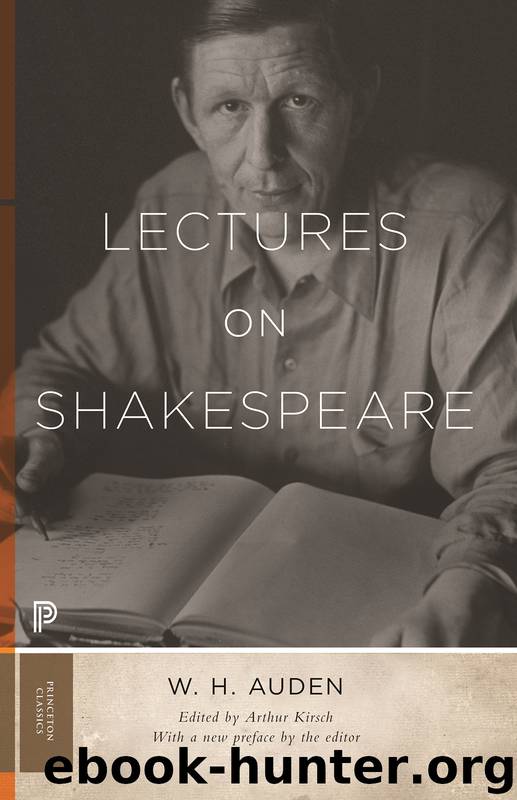Lectures on Shakespeare by W. H. Auden

Author:W. H. Auden
Language: eng
Format: epub
Publisher: Princeton University Press
Published: 2019-07-30T00:00:00+00:00
The idea of such an action, a pure assertion of self-autonomy, seemed to Augustine to be the central problem of ethics. One acts not on a motive of pleasure or pain, or of the rational and the irrational, but just for the hell of it. St. Augustine was the first real psychologist for he was the first to see the basic fact about human nature, namely that the natural man hates nature, and that the only act that can really satisfy him is the acte gratuit. His ego resents every desire of his natural self for food, sex, pleasure, logical coherence, because desires are given not chosen, and his ego seeks constantly to assert its autonomy by doing something of which the requiredness is not given, something which is completely arbitrary, a pure act of choice. The acte gratuit may be considered as a special case under the heading of pleasure and pain or of rational and irrational, or it may be considered primary, with the other categories secondary—it depends upon your view of psychology. One can’t prove it one way or the other. If you think the acte gratuit is primary, you believe that a man’s deepest desire is to be free of necessity through an act of pure choice.
At the same time man wants to feel important, and it is from the immediately given feelings with which he identifies himself that the natural man derives his sense of self-importance. This places him in a dilemma, for the more he emancipates himself from given necessity, the more he loses his sense of importance and becomes prey to anxiety. Necessity—hunger, for example—conditions importance. Games of all kinds, including art, are actes gratuits in which the players obey the necessity of rules freely chosen by themselves. Other actes gratuits are criminal: a man asserts his freedom by disobeying a law and retains a sense of self-importance because the law he has disobeyed is an important one, one established either by God or his society. Much crime is magic, an attempt to make free with necessities. All actes gratuits involve the Fall of Man.
Charles Williams gives the best account of the Fall. “The nature of the Fall,” he writes,
—both while possible and when actual—is clearly defined. The “fruit of the tree” is to bring an increase of knowledge. That increase, however, is, and is desired as being, of a particular kind. It is not merely to know more, but to know in another method. It is primarily the advance (if it can be so called) from knowing good to knowing good and evil; it is (secondarily) the knowing “as gods.” A certain knowledge was, by its nature, confined to divine beings. Its communication to man would be, by its nature, disastrous to man. . . .
Download
This site does not store any files on its server. We only index and link to content provided by other sites. Please contact the content providers to delete copyright contents if any and email us, we'll remove relevant links or contents immediately.
4 3 2 1: A Novel by Paul Auster(12392)
The handmaid's tale by Margaret Atwood(7763)
Giovanni's Room by James Baldwin(7346)
Asking the Right Questions: A Guide to Critical Thinking by M. Neil Browne & Stuart M. Keeley(5775)
Big Magic: Creative Living Beyond Fear by Elizabeth Gilbert(5771)
Ego Is the Enemy by Ryan Holiday(5448)
The Body: A Guide for Occupants by Bill Bryson(5096)
On Writing A Memoir of the Craft by Stephen King(4944)
Ken Follett - World without end by Ken Follett(4732)
Adulting by Kelly Williams Brown(4574)
Bluets by Maggie Nelson(4556)
Eat That Frog! by Brian Tracy(4540)
Guilty Pleasures by Laurell K Hamilton(4449)
The Poetry of Pablo Neruda by Pablo Neruda(4107)
Alive: The Story of the Andes Survivors by Piers Paul Read(4033)
White Noise - A Novel by Don DeLillo(4010)
Fingerprints of the Gods by Graham Hancock(4004)
The Book of Joy by Dalai Lama(3986)
The Bookshop by Penelope Fitzgerald(3853)
